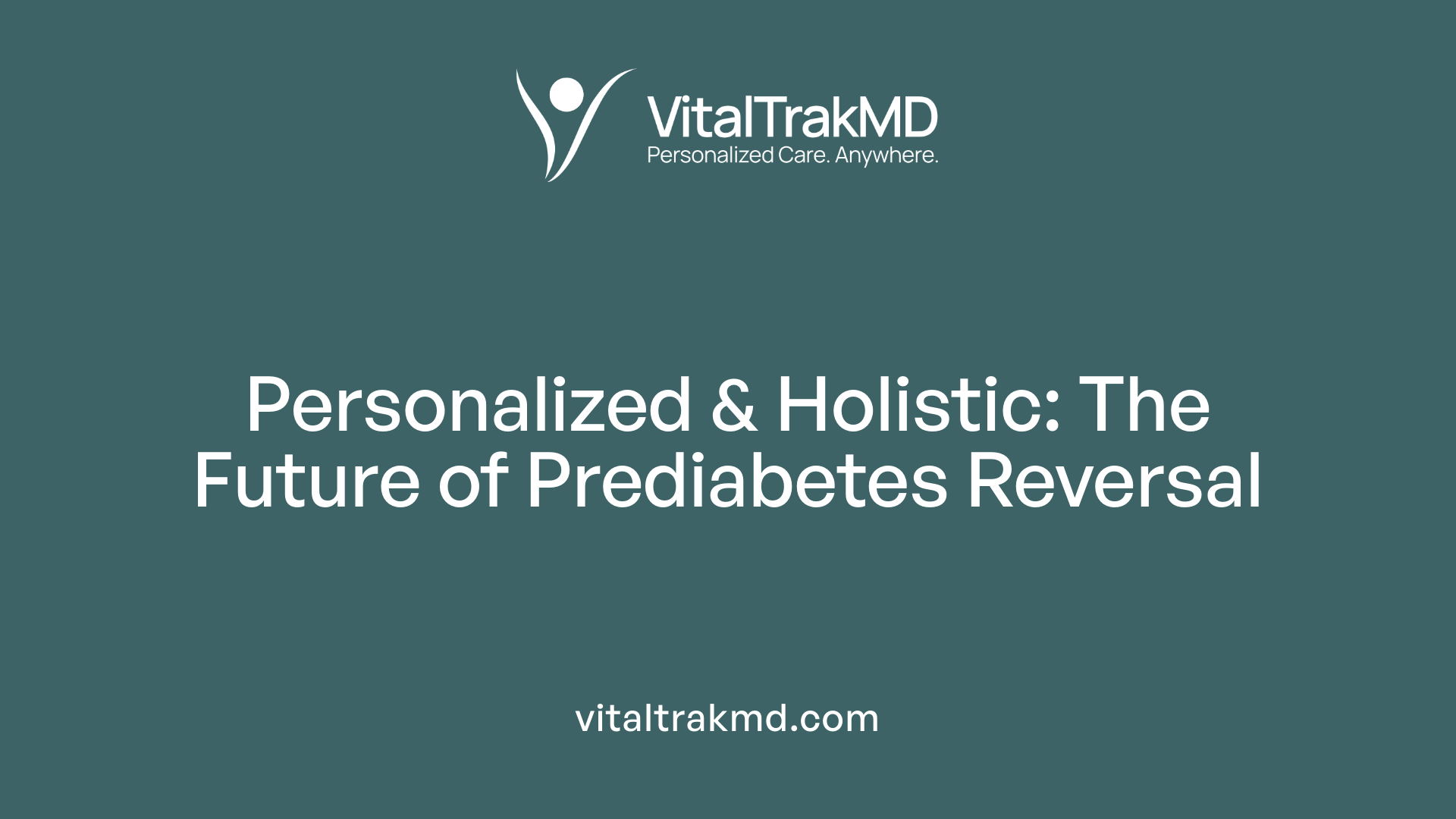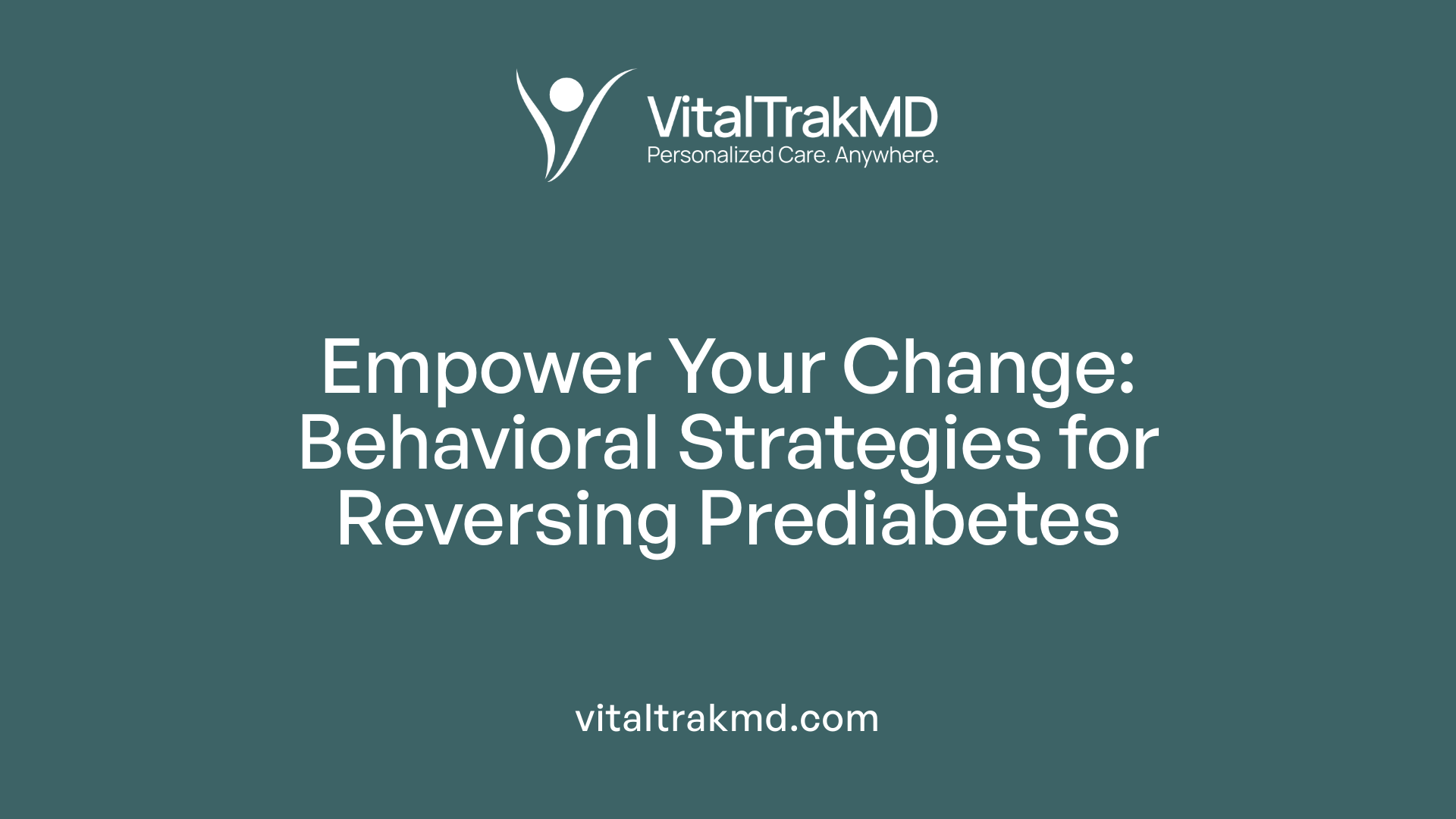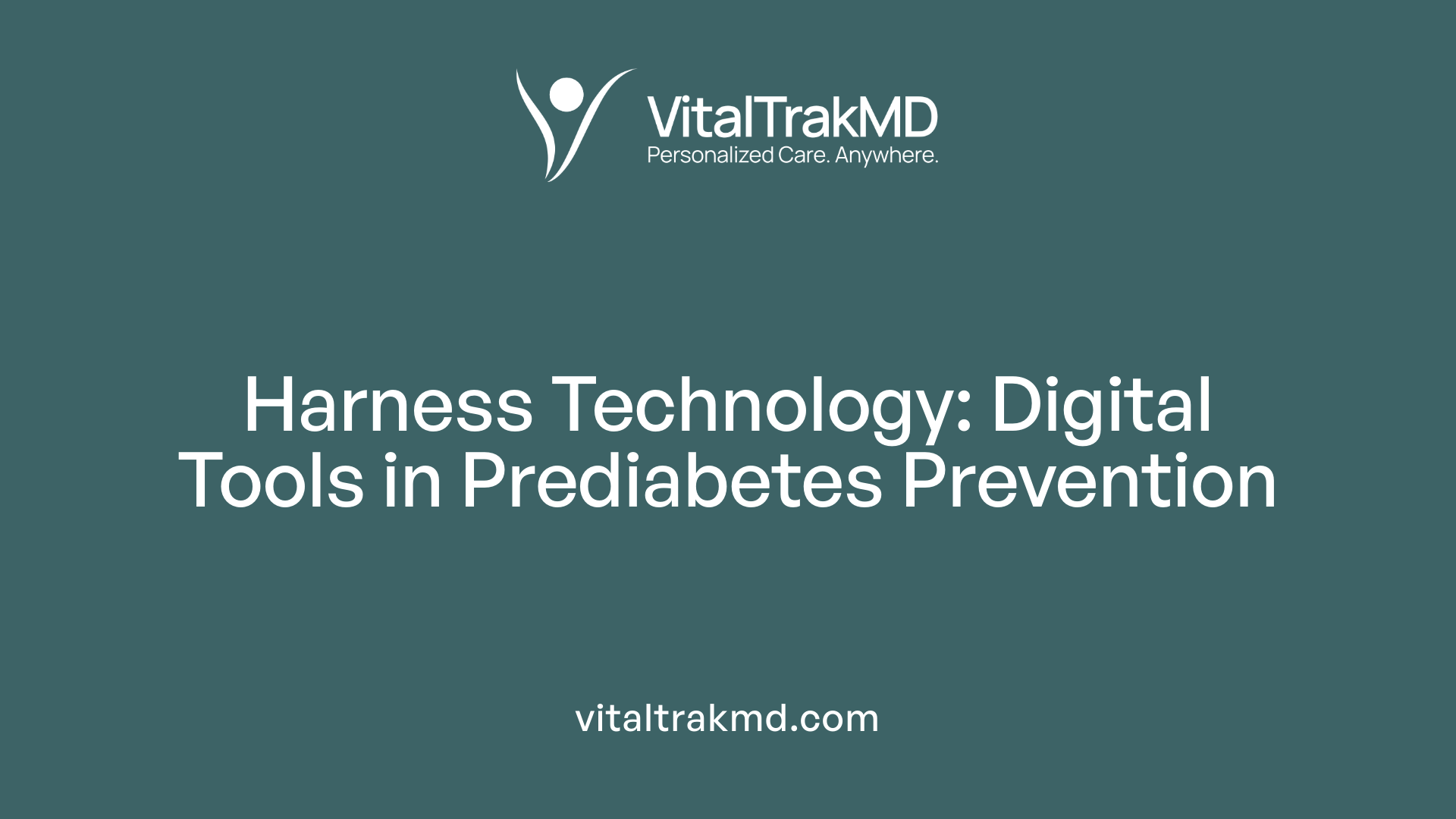Reversing Pre-Diabetes Through Personalized Hybrid Health Coaching

Understanding the Power of Personalized Interventions in Reversing Prediabetes
Prediabetes is a critical health phase that, with timely and targeted interventions, can be reversed before progressing to type 2 diabetes. Recent research underscores the significant role of personalized hybrid health coaching—integrating behavioral strategies, technological tools, and holistic health management—in achieving this goal. This article explores how tailored approaches combining digital and human coaching, comprehensive lifestyle modifications, and behavioral interventions are transforming prediabetes management.
Holistic, Personalized Approaches Are Key to Reversing Prediabetes

What is the most effective approach to reversing prediabetes through personalized health coaching?
The most successful methods for reversing prediabetes involve comprehensive strategies that encompass more than just diet and exercise. Evidence suggests that addressing sleep and stress management is equally important because these hormonal factors significantly influence blood glucose regulation.
Personalized health coaching plays a vital role by tailoring advice and support to each individual's needs. Coaches help set achievable goals, develop sustainable behaviors, and provide accountability, making lifestyle changes more manageable.
Digital tools, such as mobile apps and wearable devices, boost engagement by tracking progress, providing reminders, and offering instant feedback. For instance, programs like Sweetch utilize fully automated, personalized platforms that promote increased physical activity and weight loss. Participants in such programs have demonstrated notable improvements, including an average weight loss of 1.6 kg and a reduction in HbA1c levels by 0.1%, marking better glycemic control.
Beyond just cutting calories or increasing activity, behavioral modifications such as adopting a healthier eating pattern—like the Mediterranean diet—reducing stress, and ensuring quality sleep result in better blood pressure, fasting insulin levels, and overall metabolic health.
This integrated approach, delivered through various settings including digital platforms and face-to-face coaching, has shown to enable nearly half of participants to revert to normal blood glucose levels within six months. These results highlight that targeting multiple facets of health simultaneously produces more meaningful and lasting improvements in prediabetic individuals.
Overall, combining behavioral support, personalized strategies, and holistic health focus creates a robust framework for reversing prediabetes and lowering the risk of progression to type 2 diabetes.
Evidence Supporting the Success of Personalized Stimuli in Reversing Prediabetes
Numerous scientific studies validate the effectiveness of personalized health coaching in reversing prediabetes. One notable study involving 508 subjects found that nearly half (49%) of participants with prediabetes reverted to normal blood glucose levels after six months of a comprehensive intervention. The improvements were significant, with the average fasting blood glucose decreasing by 12%, from 105.4 mg/dL to 92.4 mg/dL, indicating better glucose regulation.
Clinical outcomes extended beyond blood sugar control. Participants experienced reductions in other risk markers, such as blood pressure and fasting insulin levels. They also reported decreased perceived stress and fatigue, along with improved diet adherence. These results emphasize the importance of a holistic approach that includes not only diet and exercise but also sleep and stress management, which influence hormonal factors affecting glucose metabolism.
Support for digital and app-based coaching is also strong. The Sweetch app, used in a 3-month study of 55 adults with prediabetes and elevated BMI, demonstrated high usability with median System Usability Scale scores of 78% for the app itself and 93% for its digital body weight scale. Participants increased physical activity by nearly 3 MET-hours per week and lost an average of 1.6 kg, with a modest decrease in HbA1c of 0.1%, indicating improved glycemic control.
Building on these findings, large randomized trials are comparing AI-driven coaching programs to traditional, human-led interventions. These studies aim to confirm that digital health coaching can be as effective as in-person coaching. For example, a trial conducted across Johns Hopkins Medicine and Reading Hospital tests whether AI-powered programs can achieve comparable risk reduction outcomes, including weight loss and HbA1c improvement, at 12 months.
Overall, the accumulated evidence highlights that behavioral modifications driven by personalized, technology-supported coaching significantly impact blood glucose levels, reduce medication dependence, and potentially reverse prediabetes. These approaches are promising, scalable, and adaptable for broader clinical use, especially given their safety and high acceptability among participants.
Digital Innovation in Prediabetes Prevention and Reversal
How does digital health coaching, including AI and behavioral interventions, support prediabetes management?
Digital health coaching has become a promising approach for managing prediabetes. It leverages technologies such as artificial intelligence (AI), mobile applications, wearable devices, and remote coaching methods to promote healthier behaviors and prevent the progression to Type 2 diabetes.
Personalized digital platforms can provide real-time guidance based on individual data. For example, apps can monitor physical activity, dietary intake, sleep, and stress levels. Using AI algorithms, these platforms analyze ongoing data to identify risk patterns, predict blood glucose trends, and suggest tailored interventions. This continuous, data-driven approach helps individuals make informed choices about their lifestyle.
Wearable devices and connected scales enable remote monitoring, offering immediate feedback and motivation. For instance, tracking weight and activity levels can inform users about their progress and areas needing improvement. Automated alerts and reminders support adherence to dietary and exercise plans.
Behavioral change is central to prediabetes management. Digital tools employ techniques such as motivational interviewing and personalized goal setting. They adapt strategies to fit individual readiness and preferences, which increases engagement and sustainability.
Programs like smartphone apps combined with coaching calls or messaging foster ongoing support. These interventions are particularly valuable for individuals with limited access to traditional in-person programs, making prevention more accessible.
Research indicates that such integrated digital approaches can lead to measurable health benefits. Participants in technology-enabled programs often show reductions in fasting blood glucose and HbA1c levels, weight loss, improved blood pressure, and decreased perceived stress.
In summary, digital health coaching, through AI and behavioral strategies, enhances prediabetes management by providing personalized, continuous, and accessible support. This innovation accelerates early intervention efforts, empowering individuals to take charge of their health and reduce their risk of developing diabetes.
Behavioral Strategies That Empower Lifestyle Changes

How can behavioral interventions in health coaching influence lifestyle changes to prevent or reverse prediabetes?
Behavioral interventions during health coaching play a crucial role in shaping lifestyle modifications aimed at preventing or reversing prediabetes. These strategies target core behavioral factors such as motivation, habits, and self-efficacy—the confidence to take action and sustain change.
One effective approach is goal setting, where individuals establish clear, achievable objectives related to diet, physical activity, sleep, and stress management. For example, a participant might aim to walk 30 minutes daily or reduce sugar intake. This provides direction and a sense of accomplishment, reinforcing positive behaviors.
Problem solving and self-monitoring are also vital. Coaches teach individuals to identify barriers—like lack of time or access to healthy foods—and develop practical solutions. Self-monitoring tools, such as food diaries or digital apps, help track progress, increase accountability, and provide feedback.
Communication techniques tailored to personal needs enhance engagement. Motivational interviewing, which emphasizes empathy and exploration of ambivalence, supports individuals in discovering personal reasons for change. Simplifying messages, using visual aids, and providing information in multiple formats ensure understanding and retention.
Adding behavioral skills training, like teaching meal prepping or stress reduction strategies, equips individuals with tangible tools for daily practice. Social support from family, friends, or peer groups further reinforces commitment and normalizes healthy behaviors.
Community resources, including local fitness programs or nutrition education, supplement coaching and offer ongoing encouragement.
While these approaches are supported by evidence for improving glycemic control, their success depends on personalization. High-quality, adaptable interventions that consider individual circumstances—such as cultural background, social environment, and readiness to change—are most effective.
Overall, behavioral strategies embedded in health coaching can substantially influence lifestyle patterns, leading to better blood glucose regulation and reduced risk of progressing to type 2 diabetes.
The Role of Technology in Enhancing Prevention Strategies
 Digital platforms, wearables, mobile applications, and remote coaching are transforming how prediabetes can be managed and potentially reversed. These technologies enable personalized, scalable, and accessible interventions that support lifestyle changes.
Digital platforms, wearables, mobile applications, and remote coaching are transforming how prediabetes can be managed and potentially reversed. These technologies enable personalized, scalable, and accessible interventions that support lifestyle changes.
Several studies highlight the effectiveness of these tools. For instance, the Sweetch mobile app, paired with digital weight scales, helped adults with prediabetes increase physical activity, lose weight, and improve blood glucose markers. Participants showed significant weight loss (on average 1.6 kg), increased activity (by 2.8 MET-hours per week), and slight improvements in glycemic control, with HbA1c decreasing by 0.1%. Such interventions are well-received, with high usability scores, and no adverse events reported.
Similarly, digital health coaching programs like 'Healthy at Home' and other app-based programs provide tailored support through SMS, phone calls, and online tracking. These programs focus on setting realistic goals, encouraging behavioral adjustments, and maintaining consistent engagement, which are essential for diabetes prevention.
Wearable devices and apps facilitate real-time monitoring of physical activity, blood glucose, and weight, helping users stay motivated and informed. They also enable coaches and healthcare providers to deliver timely feedback, adjust strategies, and reinforce positive habits.
Remote coaching can be particularly beneficial for underserved or resource-limited populations, increasing access to preventative care and behavioral support. For example, low-literacy educational materials, motivational interviewing, and social connectedness are incorporated to foster behavior change effectively.
Overall, integrating digital tools into prediabetes management offers a promising approach to promote sustainable lifestyle modifications. These technological solutions complement traditional care and empower individuals to take charge of their health.
Supporting Research and Innovative Technologies in Prediabetes Reversal

What scientific evidence supports the effectiveness of personalized health coaching in managing or reversing prediabetes?
Multiple clinical studies and trials provide strong evidence that personalized health coaching can significantly improve prediabetes outcomes. For example, a 6-month health coaching intervention targeting individuals with type 2 diabetes achieved an average HbA1c reduction of 0.62%, alongside improvements in diet and daily nutrition habits. Participants reduced their intake of grains, fats, and oils while increasing vegetable consumption, which partly mediated improvements in blood sugar control.
Similarly, a study presented at the American College of Cardiology showed that personalized coaching helped prediabetic patients lower their fasting blood glucose by an average of 12%, from 105.4 mg/dL to 92.4 mg/dL. Nearly half of these individuals reverted to normal glucose levels after six months. Participants also showed improvements in blood pressure, fasting insulin, perceived stress, and fatigue.
Mobile health platforms, such as the Sweetch app combined with digital scales, have demonstrated that fully automated, personalized digital coaching can promote increased physical activity and weight loss safely. In one study, users increased activity levels by an average of 2.8 MET-hours per week and lost about 1.6 kg, along with a median HbA1c decrease of 0.1%, indicating better glycemic control.
Further evidence comes from randomized controlled trials comparing AI-driven digital programs with traditional human coaching. These studies found that AI-based digital interventions could achieve at least comparable risk reduction in blood glucose and weight loss, potentially offering scalable solutions for underserved populations.
Overall, these studies affirm that targeted behavioral modifications, delivered via digital or face-to-face coaching, can effectively decrease the risk factors associated with progression from prediabetes to type 2 diabetes. They show that strategies involving diet, physical activity, stress, and sleep management are crucial components in reversing prediabetic conditions.
Harnessing the Future of Personalized Prediabetes Care
The convergence of behavioral science, digital technology, and personalized coaching offers a promising pathway for reversing prediabetes. Evidence from clinical trials demonstrates that holistic, tailored interventions—integrating diet, exercise, sleep, stress management, and innovative digital tools—can lead to remarkable health improvements and risk reduction. As healthcare increasingly adopts such hybrid models, including AI-driven solutions and scalable digital platforms, the potential to reach underserved populations and sustain health benefits grows. Continued research and standardization efforts will further refine these strategies, empowering individuals to take control of their health and prevent the progression to diabetes. In the evolving landscape of chronic disease prevention, personalized hybrid health coaching stands out as a vital component for effective, accessible, and sustainable prediabetes management.
References
- Personalized Health Coaching Helps Reverse Progression to ...
- A Novel Approach for Fully Automated, Personalized Health ...
- Preventing diabetes with digital health and coaching for translation ...
- Prediabetes Education - Digital, Face-to-Face, Hybrid
- Effectiveness of artificial intelligence vs. human coaching in diabetes ...
- Demystifying diabetes health coaching: A scoping review unveiling ...
- Diabetes Care Program | Stanford Health Care
- Effectiveness of Health Coaching in Diabetes Control and Lifestyle ...
- Personalized Health Coaching May Prevent Progression to Type 2 ...
Recent articles
Want to Feel Better and Live Healthier?
Join hundreds of patients taking control of their health with personalized care that fits their life – not the other way around.
Rated 4.8/5 by 32+ customers







